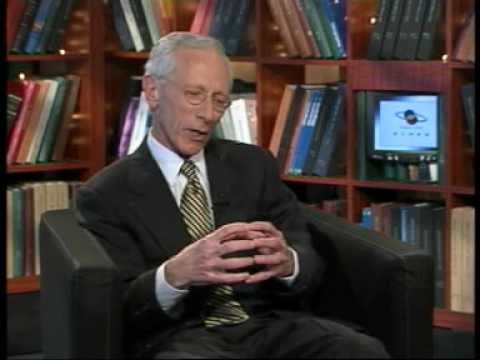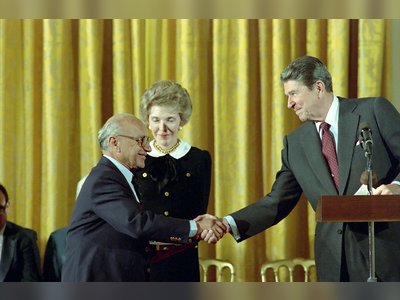מורשת גדולי האומה
בזכותם קיים
beta
Stanley Fischer: A Pioneer in Economics and Finance
Stanley Fischer, born on October 15, 1943, is a prominent American-Israeli economist known for his significant contributions to the field of macroeconomics. He has held esteemed positions in global banking institutions and has made substantial contributions through his writings and research.
Early Life and Education
Fischer was born in Northern Rhodesia, which is present-day Zambia. His Hebrew name is Shlomo Ben Pesach Hakohen. He was actively involved in the Zionist youth movement, HaBonim Dror. Fischer completed his secondary education in Southern Rhodesia (now Zimbabwe), excelling in subjects like physics, mathematics, and chemistry. However, it was a family friend who encouraged him to pursue economics.
He earned his undergraduate degree in economics at the London School of Economics (LSE) from 1962 to 1965. Afterward, he traveled to Israel and then completed his master's degree in economics at LSE from 1966 to 1969. Finally, Fischer obtained his Ph.D. in economics from the Massachusetts Institute of Technology (MIT) in 1969.
Roles in the United States
Fischer started his career as an Assistant Professor of Economics at the University of Chicago and later became a tenured professor at MIT. He was also a visiting professor at the Hebrew University of Jerusalem and Stanford University. Fischer supervised notable economists during his time at MIT, including Ben Bernanke, who later became the Federal Reserve Chairman. Fischer was an active member of various academic and economic organizations and served on boards such as the National Bureau of Economic Research (NBER) and the International Institute for Economics (IIE).
In 1985, Fischer was appointed as one of the American economic advisors sent to assist Israel in implementing its stabilization plan.
From January 1988 to August 1990, he served as the Deputy Managing Director and Chief Economist of the World Bank. Following this, Fischer was named the Elizabeth and James Killian Professor and Head of the Economics Department at MIT.
From September 1994 to the end of August 2001, Fischer served as the First Deputy Managing Director of the International Monetary Fund (IMF).
In February 2002, Fischer transitioned to the private sector, serving as Vice Chairman of Citigroup, then the world's largest commercial bank. In this role, he chaired the public sector group, chaired the risk committee of the corporation, and served as the President of Citigroup International.
During his tenure at the IMF and after his move to Citigroup, Fischer faced criticism for representing certain interest groups in the U.S. government. In 2002, Nobel laureate Joseph Stiglitz published a critical book titled "Globalization and Its Discontents," in which he questioned whether Fischer was rewarded for doing what the U.S. government instructed him to do.
Governor of the Bank of Israel (2005–2013)
On May 1, 2005, Fischer was appointed as the Governor of the Bank of Israel. He relocated to Israel and acquired Israeli citizenship as per the Law of Return.
In May 2010, Fischer was reappointed for a second term. This followed the passage of a law amending the Bank of Israel Act, which created tensions regarding his position. During discussions in the Knesset Finance Committee before the law's approval, Member of Knesset Shelly Yachimovich expressed concerns about Fischer's role:
"We have been dealing with this law while you and your personality are opposite us. There is a great failure here because this law indeed grants broader powers to the Governor of the Bank of Israel, powers that were not given in the past, an expansion of existing powers. I am concerned about the implications of this law if, instead of you, a mediocre governor were to assume the position, for example, and not a governor as distinguished as you. Our support for the law was largely due to the immense esteem we hold for you and your leadership in recent crises. I think that what you owe us in return is an extension of your tenure."
Deputy Chairman of the Federal Reserve (2014–2017)
On January 10, 2014, Fischer was nominated by U.S. President Barack Obama for the position of Vice Chairman of the Federal Reserve, succeeding Janet Yellen. Fischer began his tenure in June. However, he announced his resignation on September 6, 2017, citing personal reasons.
His Stance on the Global Economic Crisis and Its Impact on Israel
In July 2012, Fischer made a statement predicting that the Israeli economy would be affected by the global financial crisis originating in the Eurozone. He praised the government's steps in raising taxes and implementing budget cuts but also emphasized the need for continued active monetary policy by the Bank of Israel to maintain price stability, support economic growth, and ensure financial system stability.
Personal Life
Stanley Fischer is married to Rhoda Fischer, whom he met during his involvement with the Zionist youth movement. Rhoda became a respected figure in the Negev region of Israel, founding a rehabilitation village for people with disabilities called Aleh Negev. While in Israel, the Fischers resided in Herzliya.
The couple has three children: Michael, a medical doctor; David, the Vice President of Marketing for Facebook; and Jonathan, the President of Gravitas Ventures, an American film production company.
In 2014, Stanley Fischer's net worth was estimated to be between $14.6 million and $56.3 million, making him one of the wealthiest individuals in the Federal Reserve System.
Published Works
Stanley Fischer authored several books and edited many others, including:
1. "Macroeconomics" (with Rudiger Dornbusch and Richard Startz)
2. "Lectures in Macroeconomics" (with Olivier Blanchard)
3. "Economics" (with Rudiger Dornbusch and Richard Schmalensee)
4. "IMF Essays From a Time of Crisis"
5. "Indexing, Inflation, and Economic Policy"
Additionally, Fischer served as the editor of the "NBER Macroeconomics Annual" and various other economic journals from 1986 to 1994.
Stanley Fischer's career has left an indelible mark on the field of economics and finance, and his contributions continue to be influential in shaping economic policies both in the United States and internationally.
Fischer was born in Northern Rhodesia, which is present-day Zambia. His Hebrew name is Shlomo Ben Pesach Hakohen. He was actively involved in the Zionist youth movement, HaBonim Dror. Fischer completed his secondary education in Southern Rhodesia (now Zimbabwe), excelling in subjects like physics, mathematics, and chemistry. However, it was a family friend who encouraged him to pursue economics.
He earned his undergraduate degree in economics at the London School of Economics (LSE) from 1962 to 1965. Afterward, he traveled to Israel and then completed his master's degree in economics at LSE from 1966 to 1969. Finally, Fischer obtained his Ph.D. in economics from the Massachusetts Institute of Technology (MIT) in 1969.
Roles in the United States
Fischer started his career as an Assistant Professor of Economics at the University of Chicago and later became a tenured professor at MIT. He was also a visiting professor at the Hebrew University of Jerusalem and Stanford University. Fischer supervised notable economists during his time at MIT, including Ben Bernanke, who later became the Federal Reserve Chairman. Fischer was an active member of various academic and economic organizations and served on boards such as the National Bureau of Economic Research (NBER) and the International Institute for Economics (IIE).
In 1985, Fischer was appointed as one of the American economic advisors sent to assist Israel in implementing its stabilization plan.
From January 1988 to August 1990, he served as the Deputy Managing Director and Chief Economist of the World Bank. Following this, Fischer was named the Elizabeth and James Killian Professor and Head of the Economics Department at MIT.
From September 1994 to the end of August 2001, Fischer served as the First Deputy Managing Director of the International Monetary Fund (IMF).
In February 2002, Fischer transitioned to the private sector, serving as Vice Chairman of Citigroup, then the world's largest commercial bank. In this role, he chaired the public sector group, chaired the risk committee of the corporation, and served as the President of Citigroup International.
During his tenure at the IMF and after his move to Citigroup, Fischer faced criticism for representing certain interest groups in the U.S. government. In 2002, Nobel laureate Joseph Stiglitz published a critical book titled "Globalization and Its Discontents," in which he questioned whether Fischer was rewarded for doing what the U.S. government instructed him to do.
Governor of the Bank of Israel (2005–2013)
On May 1, 2005, Fischer was appointed as the Governor of the Bank of Israel. He relocated to Israel and acquired Israeli citizenship as per the Law of Return.
In May 2010, Fischer was reappointed for a second term. This followed the passage of a law amending the Bank of Israel Act, which created tensions regarding his position. During discussions in the Knesset Finance Committee before the law's approval, Member of Knesset Shelly Yachimovich expressed concerns about Fischer's role:
"We have been dealing with this law while you and your personality are opposite us. There is a great failure here because this law indeed grants broader powers to the Governor of the Bank of Israel, powers that were not given in the past, an expansion of existing powers. I am concerned about the implications of this law if, instead of you, a mediocre governor were to assume the position, for example, and not a governor as distinguished as you. Our support for the law was largely due to the immense esteem we hold for you and your leadership in recent crises. I think that what you owe us in return is an extension of your tenure."
Deputy Chairman of the Federal Reserve (2014–2017)
On January 10, 2014, Fischer was nominated by U.S. President Barack Obama for the position of Vice Chairman of the Federal Reserve, succeeding Janet Yellen. Fischer began his tenure in June. However, he announced his resignation on September 6, 2017, citing personal reasons.
His Stance on the Global Economic Crisis and Its Impact on Israel
In July 2012, Fischer made a statement predicting that the Israeli economy would be affected by the global financial crisis originating in the Eurozone. He praised the government's steps in raising taxes and implementing budget cuts but also emphasized the need for continued active monetary policy by the Bank of Israel to maintain price stability, support economic growth, and ensure financial system stability.
Personal Life
Stanley Fischer is married to Rhoda Fischer, whom he met during his involvement with the Zionist youth movement. Rhoda became a respected figure in the Negev region of Israel, founding a rehabilitation village for people with disabilities called Aleh Negev. While in Israel, the Fischers resided in Herzliya.
The couple has three children: Michael, a medical doctor; David, the Vice President of Marketing for Facebook; and Jonathan, the President of Gravitas Ventures, an American film production company.
In 2014, Stanley Fischer's net worth was estimated to be between $14.6 million and $56.3 million, making him one of the wealthiest individuals in the Federal Reserve System.
Published Works
Stanley Fischer authored several books and edited many others, including:
1. "Macroeconomics" (with Rudiger Dornbusch and Richard Startz)
2. "Lectures in Macroeconomics" (with Olivier Blanchard)
3. "Economics" (with Rudiger Dornbusch and Richard Schmalensee)
4. "IMF Essays From a Time of Crisis"
5. "Indexing, Inflation, and Economic Policy"
Additionally, Fischer served as the editor of the "NBER Macroeconomics Annual" and various other economic journals from 1986 to 1994.
Stanley Fischer's career has left an indelible mark on the field of economics and finance, and his contributions continue to be influential in shaping economic policies both in the United States and internationally.




